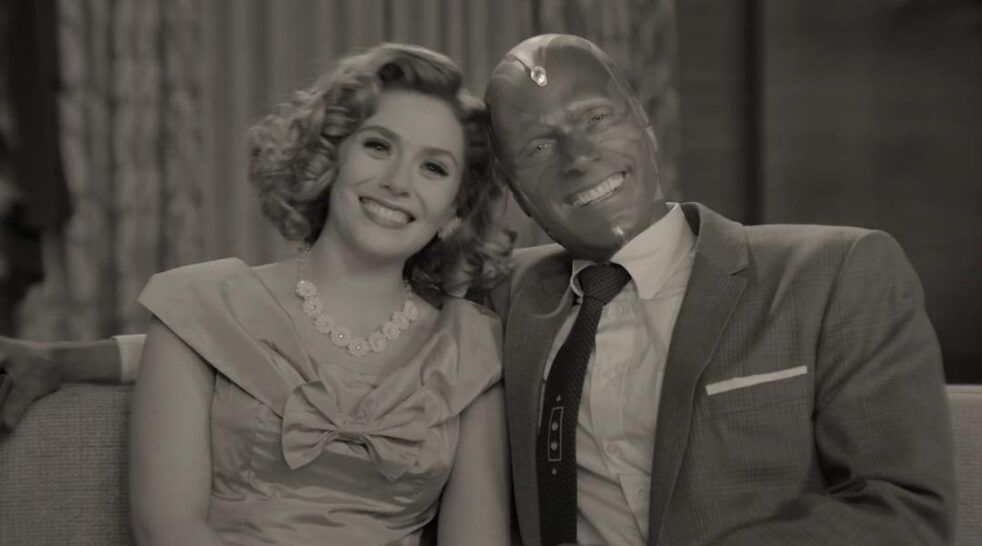Proceed with caution: abundant spoilers for “WandaVision” lie ahead.
Our Take: 4 Stars
When Tony Stark snapped his fingers in the climatic ending of “Avengers: Endgame” (2019), many devoted fans might have felt a little lost as to what was next for the Marvel Cinematic Universe. Marvel wrapped up Phase III with some of the biggest revelations in its history, and it was difficult to see how the franchise was going to follow up on blockbusters like “Endgame” and the subsequent “Spiderman: Far From Home.”
“WandaVision,” a television series exclusively on Disney+, offered a peek into what fans can expect from Phase IV. Rather than riding on the success and ubiquity of previous films for shock factor and fan service, Marvel spread its wings with “WandaVision” while still remaining true to its hallmark characters and story lines.
At first glance, “WandaVision” might have been a hard sell: the trailer showed two Avengers (one of whom is supposed to be dead) who look like they’ve been dropped into the Dick Van Dyke Show. Yet, creator Jac Schaeffer (“Timer”) and director Matt Shakman (“Cut Bank”), with the talents of franchise icons at their fingertips and all the panache of any Marvel production in their arsenal, managed to pull that off and more.
“WandaVision” follows Wanda (Elizabeth Olsen, “Wind River”) and Vision (Paul Bettany, “A Beautiful Mind”) as they play out a suburban idyll in a series of episodes that each pay homage to a different era in sitcom history.
The show’s first few episodes are so authentically true to their source material that viewers can’t help but be entertained. But everything is not as it seems, and something sinister lurks behind the hilarity unfolding on-screen. In classic Marvel fashion, the early episodes are littered with Easter eggs and clues to what is actually going on.
As the show jumps from the ‘60s to the ‘70s to the ‘80s, the puzzle starts to come together: the couple’s shiny, silver-screen life is created and controlled by Wanda herself, in a desperate attempt to bring back the not-quite-man she loves. Meanwhile, outside Wanda’s “Hex,” Captain Monica Rambeau (Teyonah Parris, “Dear White People”), Jimmy Woo (Randall Park, “Fresh Off the Boat”) and Darcy Lewis (Kat Dennings, “Thor: The Dark World”) begin to put the pieces together.
From there, “WandaVision” unfolds along two storylines: Wanda and Vision in “WandaVision,” the show within the show, alongside Rambeau, Woo and Lewis as they seek to save Wanda from herself, at cross purposes with S.W.O.R.D. acting director Tyler Hayward (Josh Stamberg, “Parenthood”).
But the two narratives quickly blur into one as the world inside the Hex collides with the one outside it.
It’s not a perfect show, of course. It’s hard to feel invested in Woo, Lewis or even Rambeau as their storyline bounces between over-the-top dramatics and painfully cheesy humor. Some lines sound straight of an early 2000s show on Disney Channel, which is a little ironic.
A few plot points — particularly the show’s conclusion — feel rushed and introduced too late in the game. But none of these defects detract from the experience of watching the show.
Every one of the eight episodes is a meticulous production worthy of the rest of the franchise, with the level of care and thought (and probably also the big budget) that hallmarks Marvel movies. From coloring to costuming to aspect ratio to quirky theme songs, each episode keeps viewers on the edge of their seats.
But beyond production, the episodic format is new for Marvel, and the creators of “WandaVision” use it to their advantage rather than trying to recreate the epic action of a typical MCU film. Nothing is too weird or whimsical for the show, and it is impossible to get tired of it as it moves seamlessly from creepy to hilarious and back.
The show’s quirkiness is held together by brilliant performances from its lead actors. Paul Bettany brings another level of humanity to Vision, in no small part through a never-before-seen (for Vision) hilarity. Kathryn Hahn’s (“The Secret Life of Walter Mitty”) portrayal of Agatha Harkness has won her adoration as the show’s zany villain. And at the heart of “WandaVision” is Wanda herself, the woman as well as the superhero, in a grounded, powerful performance by Elizabeth Olsen.
“WandaVision” deals in binaries — the show within the show, the dual narrative inside and outside the Hex, the contrasts between Agatha and Wanda. On the one hand, it is a whimsical new experience for Marvel, and a preview into what is to come for the MCU.
The genius of the show, however, is the way that it delves into Wanda’s character as she grieves the loss of everything she has ever known and loved. At its core, it is a touching portrayal of a woman forced to deal with the unimaginable.
As it examines Wanda’s past, it offers a heartbreaking look into a woman’s response to loss. The show has many unexpectedly poignant moments. One of the most memorable is when Vision asks Wanda, “What is grief, if not love persevering?”
The sitcoms that “WandaVision” references, from “The Dick Van Dyke Show” to “Bewitched” to “Full House” to “Modern Family,” are cultural landmarks because we see ourselves in them.
While “WandaVision” is poised to take its place alongside these household names, its real legacy will be the way it reminds us that superheroes are not so unlike us after all.
